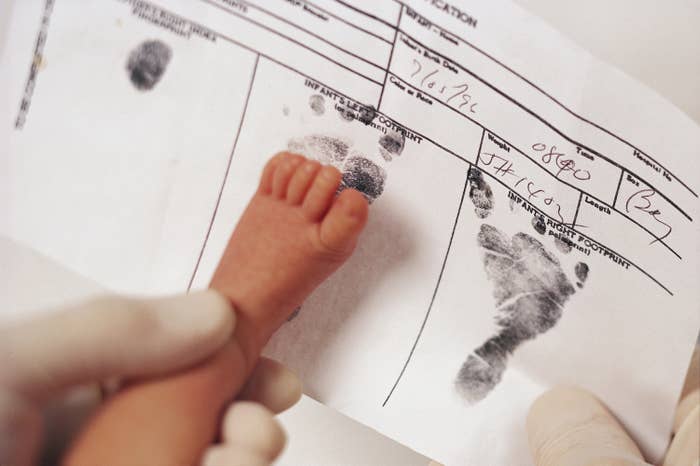
An Oklahoma judge ruled on Monday that a lesbian mother is legally no longer her son’s parent — instead awarding parental rights to her ex-wife and their sperm donor.
The case is causing alarm among LGBTQ advocates in Oklahoma, who fear it could set the stage for similar proceedings across the state. It’s also raising questions about how courts might chip away at marriage equality protections that had seemingly already been settled by the Supreme Court; an attorney for the woman told BuzzFeed News they plan to appeal the ruling as unconstitutional.
In summer 2019, Kris Williams married Rebekah Wilson. The couple had long talked about having a child together, according to an article Wilson wrote in 2021. Two months after their marriage, Wilson gave birth to a son whom she had through a sperm donor she found on a paternity website.
Williams and Wilson were listed as the boy’s mothers on his birth certificate, and they divorced in 2021. Wilson then moved in with the donor, Harlan Vaughn, and took the boy with her, accusing Williams of domestic abuse and harassment. (Williams’s attorney told BuzzFeed News she hasn’t been able to share “her side of the story” but did not immediately provide details.) In January 2022, Vaughn filed for paternity, prompting the court to get involved in determining the toddler’s legal parents.
On Monday, Oklahoma County District Judge Lynne McGuire stripped parental rights from Williams and awarded them to Vaughn, the donor.
The judge said that because Williams did not officially adopt the boy, nor did she carry the pregnancy, she could not establish a “mother–child relationship” under current Oklahoma law. The judge added that Williams was aware she would need to pursue adoption to secure parental rights.
“While Williams was able to prove by a preponderance of the evidence that she acted in a parental role during her marriage, there was no evidence presented regarding the length of time it would take to establish a ‘meaningful emotional relationship with the child,” the judge wrote in the ruling. “The reality is that the law provides a legal remedy to those seeking parental rights. There was a legal remedy available to Williams. She knowingly chose not to pursue it.”
In general, married couples who have children in wedlock — whether they are same-sex or heterosexual — are legally presumed to be the parents. But the Oklahoma judge said that the state’s 2014 parentage act preceded marriage equality, which the Supreme Court extended nationally in 2015.
Williams believes the question of her parental rights wouldn’t be a question if she wasn’t a lesbian.
“I don’t feel like we should have to adopt our own children,” Williams told the 19th. “If I was a man, then nobody could come back and you know, question whether that child was mine or not, after they’re the age of 2.”
Today, Oklahoma presents a hostile legal and social landscape for LGBTQ people: The Republican-controlled Legislature has introduced over three dozen anti-LGBTQ bills, prompting scores of queer families to leave the state.
Williams’s lawyer Robyn Hopkins told BuzzFeed News they can successfully appeal because of the 2015 Supreme Court ruling on Pavan v. Smith, which found that it’s unconstitutional to discriminate against same-sex couples when determining a child’s legal parents.
“How [the judge] gets around that, your guess is as good as mine,” Hopkins said. “We’ll have to take it up to the Supreme Court for them to tell us to follow the Constitution.”
Hopkins pushed back against the argument that Williams should have adopted the son. They said that many advocates have pushed for “second parent adoptions” as a way to preserve parental rights for nonbiological parents, but that strategy can present challenges for queer families — and not only when couples get divorced or separate.
“What happens when you’re in the middle of an adoption, but the two of you decide to separate? You have to be happily married, because you need the birth mother to consent to the adoption,” they said. “But also, what happens if you can’t afford an adoption or don’t know how to do it or if you don’t believe in marriage? There’s tons of straight people out there that do paternity cases, and they’re not married.”
Hopkins noted that Williams’s case was highlighted as part of a recent report from Human Rights Watch that examines violence against lesbian, bisexual, and nonbinary people.
“We are all just under attack over here,” Hopkins said about the current anti-LGBTQ climate in Oklahoma.
Williams’s case is not the first time that lesbians have lost parental rights due to a lack of recognition of same-sex couples in the eyes of the law. In the 1990s, a lesbian couple, Sandra Russo and Robin Young, lost a four-year legal battle with their sperm donor, who was eventually awarded parental rights over their child.
Though the Supreme Court ruled in Pavan that same-sex married couples should be the presumed parents of children born in wedlock, lawyers say Williams’s case could have frightening implications for LGBTQ couples in Oklahoma — and the rest of the country.
“The concern is if Kris loses, that’s going to set some pretty bad precedent in the state of Oklahoma, and possibly beyond,” Hanna Roberts, an ACLU attorney, told the 19th in May last year. “I think that this is just the first time that there has been such an adverse ruling that is so contrary to equal protection.”
